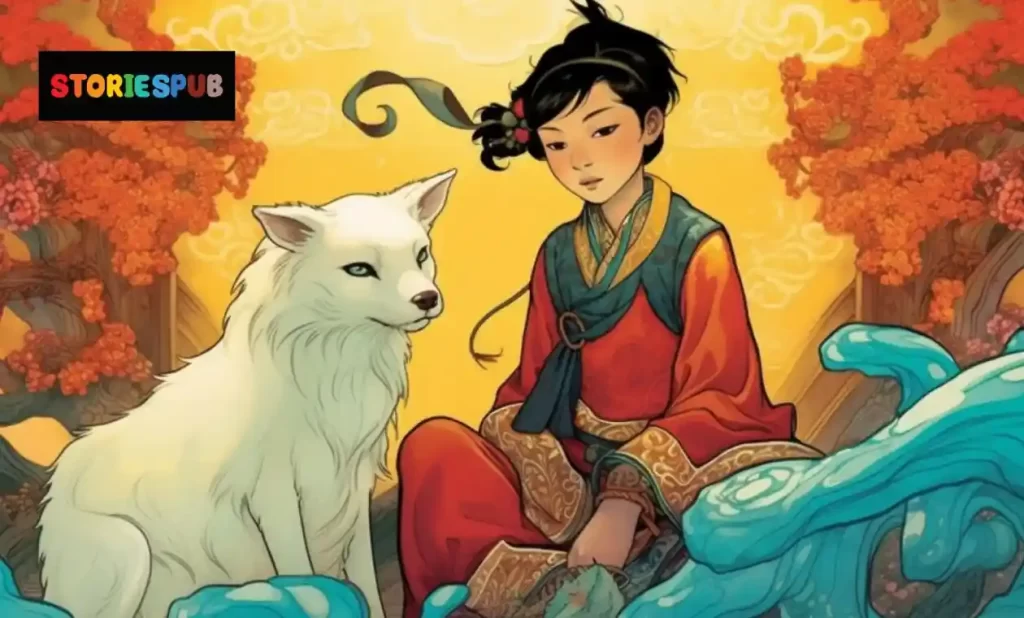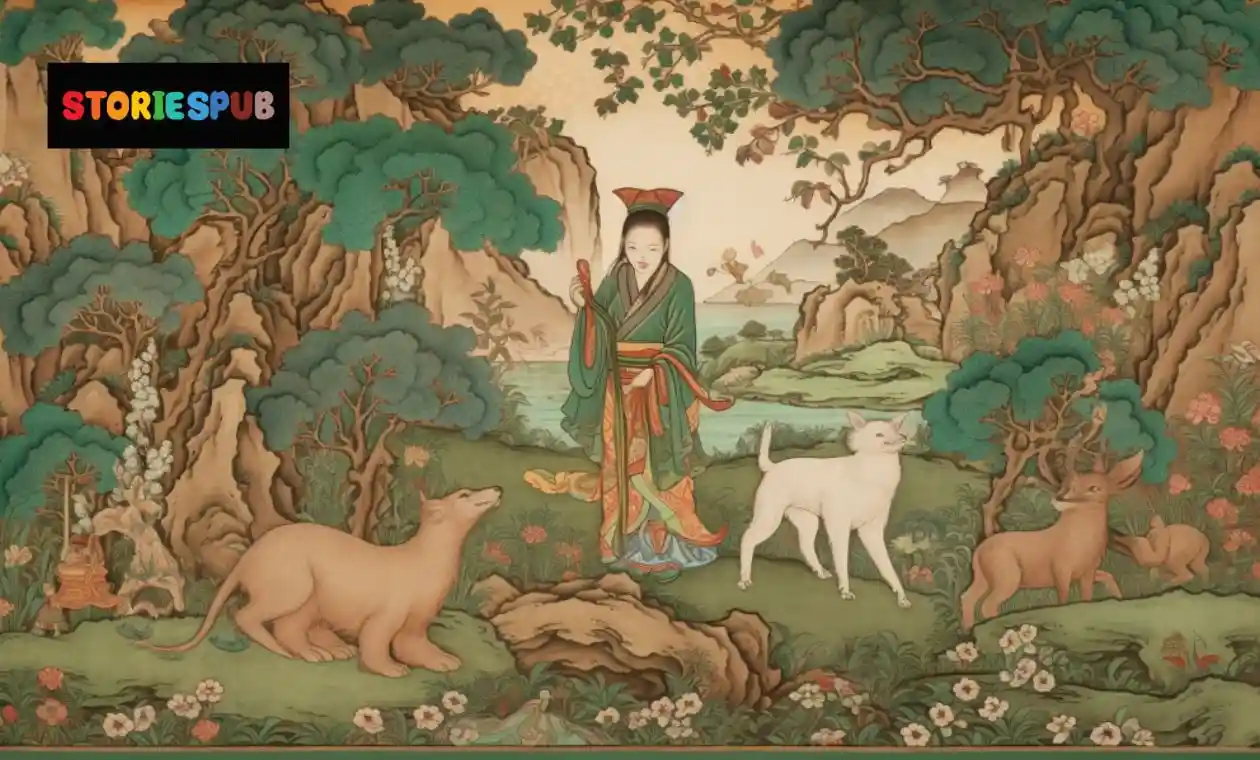
Once upon a time, in a lush and enchanting forest, there lived a young Bodhisattva who possessed a spell of immense power. This spell had the ability to subdue the entire world, commanding all creatures that inhabited the forest. The young Bodhisattva was known for his wisdom, kindness, and a deep understanding of the natural world. He always sought to use his knowledge for the benefit of others.
One fine morning, as the young Bodhisattva sat under a majestic banyan tree, carefully memorizing the powerful spell, a mischievous jackal named Sabbadatha happened to be passing by. Curiosity piqued, Sabbadatha stealthily approached, intrigued by the mysterious incantation that fell from the Bodhisattva’s lips.
Unbeknownst to the Bodhisattva, the cunning jackal’s ears were sharp, capturing every word of the spell. Determined to seize this opportunity for personal gain, Sabbadatha committed the spell to memory, ready to exploit its power for his own ambitions.
In the days that followed, Sabbadatha began using the spell to exert control over the creatures of the forest. Lions, tigers, elephants, and even the birds of the air—all were subject to the jackal’s commands. With a wicked grin, Sabbadatha would sit atop a magnificent lion, who stood proudly on the backs of two mighty elephants. From this lofty throne, the jackal believed himself to be the undisputed ruler of the forest.
Word of Sabbadatha’s rise to power spread swiftly throughout the land, sending shivers of fear and obedience among the creatures. The once harmonious forest became a place of trepidation, as animals trembled under Sabbadatha’s rule. The jackal reveled in his newfound authority, issuing commands with an air of superiority.
However, the young Bodhisattva, whose heart overflowed with compassion, saw through Sabbadatha’s facade. He knew that the jackal’s intentions were far from noble, and he resolved to teach him a lesson that would leave a lasting impact.
Gathering all the animals of the forest, the Bodhisattva shared his plan. He explained that if they were to stuff their ears with flour, the lion’s mighty roars would be muffled, rendering Sabbadatha’s commands powerless. Intrigued and eager to regain their freedom, the animals readily agreed to the Bodhisattva’s scheme.
As the sun set on the eve of the grand plan, the forest was filled with a palpable sense of anticipation. Creatures of all shapes and sizes diligently gathered flour, stuffing it into their ears as the Bodhisattva had instructed. The air was thick with determination and unity.
The following day, Sabbadatha, perched atop his regal lion, unleashed a roar that echoed through the forest. But to the jackal’s astonishment, the sound fell on deaf ears. The flour served as a shield, muffling the roar’s intensity and rendering it ineffective.
Startled by the lack of response from the forest’s inhabitants, the lion grew uneasy. Sensing their discomfort, the mighty elephants supporting the lion’s weight became frightened and overwhelmed by fear. In their panic, they lost their balance, causing Sabbadatha to lose his grip. The once powerful jackal tumbled from his lofty perch, crashing to the forest floor.
In a moment of chaos, the elephants unintentionally trampled over Sabbadatha. His reign of power came to a swift and painful end, brought about by his own misuse of the knowledge he had gained.
The forest, finally freed from Sabbadatha’s oppressive rule, breathed a collective sigh of relief. The creatures returned to their natural state of harmony and peace. Meanwhile,
the young Bodhisattva observed the events with a mix of compassion and sadness. He understood that the jackal’s downfall had come from his misguided and selfish desires.
The moral of Sabbadatha’s story resonated deeply within the hearts of all who witnessed it. It served as a powerful reminder that knowledge and power should be used for the greater good, to uplift and assist others rather than for personal gain. The consequences of misusing power were clear: one could easily fall into the very trap they had set for others.
Inspired by this profound lesson, the young Bodhisattva continued on his path of enlightenment, sharing his wisdom and compassion with all who sought guidance. The forest flourished under his gentle presence, becoming a haven of kindness, cooperation, and mutual respect.
And so, the tale of Sabbadatha, the Jackal, became a timeless parable passed down through generations. It served as a constant reminder to use our knowledge and abilities with integrity and selflessness, for only then can we truly create a world where harmony and understanding prevail.
Moral of the Story:
The moral of the story of Sabbadatha, the Jackal, is that using knowledge or power for wrong and selfish purposes can lead to one’s own destruction. If we scheme against others and dig a grave for them, we may ultimately fall into that very same grave ourselves. It is important to use our knowledge and abilities for the greater good, helping and serving others with kindness and compassion.
Lesson from the Story:
The story of Sabbadatha, the Jackal, teaches us that:
1. The misuse of power and knowledge can lead to one’s downfall: Sabbadatha’s desire for power and control led him to misuse the spell he had learned. As a result, he not only lost his authority but also faced a tragic end. This reminds us to be responsible and ethical in how we use our own abilities and influence.
2. Selfish actions have consequences: Sabbadatha’s selfish intentions caused fear and suffering among the creatures of the forest. However, his actions ultimately backfired, leading to his own demise. The story highlights the importance of considering the impact of our choices on others and understanding that selfishness often leads to negative consequences.
3. The importance of using knowledge for good: The young Bodhisattva, in contrast to Sabbadatha, utilized his knowledge for the benefit of others. He sought to maintain harmony and teach valuable lessons rather than exploit his power. The story encourages us to use our knowledge and abilities for positive purposes, uplifting and helping those around us.
4. Compassion and kindness are essential: The Bodhisattva’s compassion and kindness were evident throughout the story. His actions aimed to bring understanding and enlightenment, even to those who misused their power. The tale reminds us of the significance of compassion and kindness in creating a harmonious and inclusive world.
5. The consequences of our actions: The story illustrates that our actions have consequences, both positive and negative. Sabbadatha’s misuse of power brought about his own downfall, serving as a reminder that our choices shape our destiny. It encourages us to be mindful of our actions and their potential ramifications.
How much did you like the Bodhisattva and the Jackal: The Dangers of Selfish Ambition? Please share your views in the comment box. Also, please share this story with your friends on social media so they can enjoy it, and for more such stories, please bookmark storiespub.com.
Check out other stories that we have:
- 1. Hindi Stories
- 2. Panchatantra stories
- 3. Moral Stories
- 4. Bed Time Stories
- 5. How to Draw
- 6. Scary stories for kids
- 7. Mythological Stories
Bodhisattva and the Jackal FAQ
Why did the animals stuff their ears with flour?
The animals stuffed their ears with flour to muffle the roar of the lion, which was Sabbadatha's source of control over them. By doing so, they rendered Sabbadatha's commands ineffective and regained their freedom.
How did Sabbadatha meet his end?
Sabbadatha's reign came to an end when the elephants supporting the lion, upon hearing the muffled roar, became frightened and lost their balance. In the ensuing chaos, Sabbadatha was accidentally trampled, leading to his demise.
What is the role of the young Bodhisattva in the story?
The young Bodhisattva serves as a wise and compassionate character in the story. He recognizes Sabbadatha's misuse of power and seeks to teach him a lesson. The Bodhisattva embodies the importance of using knowledge and abilities for the greater good.
What lesson can we learn from Sabbadatha's story?
The story teaches us about the consequences of using power selfishly and the importance of using knowledge for the benefit of others. It emphasizes the values of compassion, kindness, and ethical decision-making, reminding us that our actions shape our own destiny.





